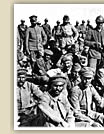
Officers,
commanders, soldiers were competing as to would die first. Their victory
has been complete. The Bulgarian front has been overthrown for a width of twelve kilometres
and a depth of approximately two kilometres. One thousand and eigth hundred Bulgarians and forty
officers have been taken prisoners. Only the Archipelago division had 24 officers
and 314 privates dead, one thousand and eight hundred injured. The total casualties of
the Greeks exceeded three thousand.
The impetus, self-sacrifice but also the insistence of the until yesterday volunteers
took by surprise their foreign partners. The commander of operations French
general Gerome said in his dispatch:
"The Greeks achieved all their objective aims in a front of twelve
kilometres. They demonstrated from beginning to end of the operation high
military virtues. The general commanding them is proud to have such men ".
The Field Marshal of Thessaloniki Guillaumat, summoned after a while in Paris as
military commander of the metropolis, announced to Romanos:
"The victory of Skra is for me an achievement equally glorious to the capture
of Mortom before Verdun.
"As soon as the Greek army gets together in Macedonia, it will be possible
to deliver a decisive blow against the Bulgarian army,
which is in a very bad state.
"The Greek army, the value of which was known and which gave anew proofs
of its bravery, has a glorious future before it".
Clemenceau himself said to the Greek ambassador:
"You comprehend my joy, when I tell you that general Guillaumat praised
the Greek army".
The most serious among the French military reviewers concludes as late as 1929
about the importance of the Greek victory:
"The success of Skra was an eye-opener for the Allies about two facts, which should
not go unnoticed: the collapse of the Bulgarian endurance and the value
of the Greek troops".
G. Ventiris, I Ellas tou 1910-1920, Tomos Defteros Athens, Ikaros editions,
1970, pp. 380-381.
|
 |
